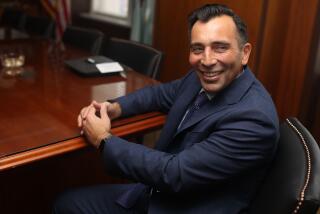Ex-Sheriff Joe Arpaio trains his sights again on his longtime nemesis, a federal judge

Joe Arpaio, a Maricopa County, Ariz., Sheriff, continues to support the “birther” movement. (Dec. 16, 2016)
The Joe and Murray Show, the high-stakes, long-running rivalry between an Arizona sheriff and federal judge, has chosen a federal appeals court as its new backdrop for an eighth year that has turned ugly and increasingly personal.
Since 2009, Arizonans have watched the drama play out between Joe Arpaio, 84, and U.S. District Court Judge G. Murray Snow, 57. Among the show’s highlights: unintentional comedy and spying allegations, remorseful confessions and digital-age intrigue, and don’t forget the investigations into investigators — followed by investigations into the investigators investigating the original investigation.
There was even a rerun.
Through it all, the two main players have maintained stoic public faces while letting accusations and counterpunches fly among mountains of legal briefs and judicial orders. The most recent came last week, when Arpaio asked the U.S. Court of Appeals for the 9th Circuit to remove Snow from his case.
During more than 20 years as sheriff of Maricopa County, Arpaio was used to defeating those who challenged him. As recently as 2012, the U.S. Justice Department cleared Arpaio of wrongdoing in a four-year abuse-of-power investigation. But in Snow, Arpaio may have met his match.
After reviewing Arpaio’s treatment of Latino drivers in massive stings targeting immigrants in the country illegally, Snow deemed Arpaio’s application of justice as “unfair, partial and inequitable,” and found the sheriff broke the law in failing to carry out a 2011 court order to refrain from bias against minorities.
Thus, the Joe and Murray Show really got going.
The two men are more similar than different. Snow and Arpaio are both conservative Arizonans with a long history of federal service, Arpaio in the Drug Enforcement Administration and Snow on the bench.
Their differences come down to their jobs, personalities and the nature of the public spotlight: Arpaio is used to it, even thrives in it, and pulled Snow, a devout Mormon, into its glare. In Phoenix, Arpaio is a longtime power player, Snow a relative unknown. Arpaio is used to turning to the court of public opinion, until he came to Snow’s federal court, where cameras aren’t allowed.
Arpaio learned years ago that by pulling federal court proceedings into the public square and personifying the government’s investigation into him, he can divert public attention from the allegations against him and raise significant sums of money for his legal defense and reelection campaigns.
He prevailed against another federal judge in 2009. At Arpaio’s urging, a Mexican American judge was disqualified because her twin sister was a prominent leader of a national Latino advocacy organization. Arpaio used the experience as further proof to his supporters that there was a grand federal conspiracy at work against him, a theme he continued while facing off against Murray last year.
“Dear Patriot,” Arpaio began a 2015 fundraising letter. “In the daily exercise of doing my job I am often targeted by groups that file legal actions against me for a variety of reasons. I do not have the personal wealth or the wherewithal to keep up with the costly demands of paying for attorneys to defend me.”
But he hasn’t been as successful with Snow, though not for lack of trying.
In May 2015, Arpaio asked for Snow to be taken off the case. His reasoning: The judge is personally involved in the case because Arpaio’s former lawyer authorized a secret investigation of Snow’s wife.
Snow declined to remove himself. The 9th Circuit Court of Appeals then denied Arpaio’s request to remove Snow. “Petitioners have not demonstrated that this case warrants the intervention of this court by means of the extraordinary remedy of mandamus,” a three-judge panel wrote in an order denying Arpaio’s motion.
If 9th Circuit justices thought that was the last Snow-family-related appeal they would receive from Arpaio, they haven’t been watching the Joe and Murray Show closely.
In August, Arpaio made his case against Snow in a fundraising letter, breaking from his usual practice of warning against a general conspiracy against him and taking the unusual step of identifying the judge as the problem.
“The judge made this decision just 10 days before my primary election!” Arpaio wrote in late August, before winning the Republican county primary. “I’m now going to have to fight tooth and nail against this court action. That’s why I need your help, right away. Barack Obama, his Justice Department and their far-left allies like the ACLU would love nothing better than to see me convicted of a crime.”
In a court filing this week, Arpaio chose another Snow family member: his brother-in-law.
Arpaio argues that Snow learned that his brother-in-law was an equity partner in the law firm representing plaintiffs against Arpaio in 2010, but did not recuse himself, though Snow did notify the parties in the lawsuit in 2012.
By then, “Judge Snow had awarded [the law firm] nearly $100,000 in attorneys’ fees at a time when only he knew that his relative might share in those fees,” according to Arpaio’s filing.
The main issue with the appeal? Arpaio had waived his right to contest the conflict of interest after Snow revealed the connection, something his attorneys say Arpaio did “to avoid delaying resolution of a case that had already significantly impaired their financial and reputational well-being.”
Now, Arpaio’s attorneys want the waiver deemed null and void, and want Snow’s connection to his brother-in-law back before the appellate court. In addition to Snow’s connection to his brother-in-law’s firm, Arpaio also alleges that Snow had improper contact with the federal monitor overseeing the Maricopa County Sheriff’s Office.
Arpaio lost his seventh bid for sheriff in November, and his successor is Paul Penzone.
Arpaio’s court costs, billed to the county, amount to more than $48 million. But those costs came in a civil trial, and Snow in August referred Arpaio to the U.S. attorney for Arizona, which charged Arpaio with criminal contempt, accusing him of violating Snow’s orders to stop profiling Latino drivers.
In criminal court, Arpaio will have to bear his own legal fees, a matter he has pledged to contest. His trial is scheduled to begin April 4. The Joe and Murray Show rolls on.
Twitter: @nigelduara
ALSO
Convicted South Carolina killer Dylann Roof to jurors: ‘Nothing wrong we me psychologically’
A Washington town rallies around ‘Officer Mick,’ and the badly wounded cop rallies as well
Obama bucks up Democrats as they prepare Obamacare fight
More to Read
Start your day right
Sign up for Essential California for news, features and recommendations from the L.A. Times and beyond in your inbox six days a week.
You may occasionally receive promotional content from the Los Angeles Times.







